Struggling with anxiety and looking for relief? Explore the top 10 amazing benefits of anxiolytic medications and how they can transform your life.
Anxiety affects millions, and if you’re feeling overwhelmed, anxiolytic medication might be just what you need. So, what exactly are anxiolytics? Anxiolytics are medications used to relieve anxiety. They work by calming the nervous system and reducing feelings of anxiety and tension. Common types include benzodiazepines (like Valium or Xanax) and non-benzodiazepine options (like buspirone). They can be effective for short-term relief, but they should be used under a doctor’s guidance due to potential side effects and dependency issues.
Okay, now, without further ado, let’s dig into all the details. Are you pretty much excited to learn more? Alright! Let’s get started!
What Are Anxiolytic Medications?
Dealing with anxiety can be really tough, but the right anxiolytic medication can help you feel calmer and more relaxed. Anxiolytics are medications used to relieve anxiety. They work by targeting neurotransmitters in the brain to reduce excessive nervous activity, helping you feel more at peace. They can be a great tool for managing anxiety disorders and improving your quality of life.
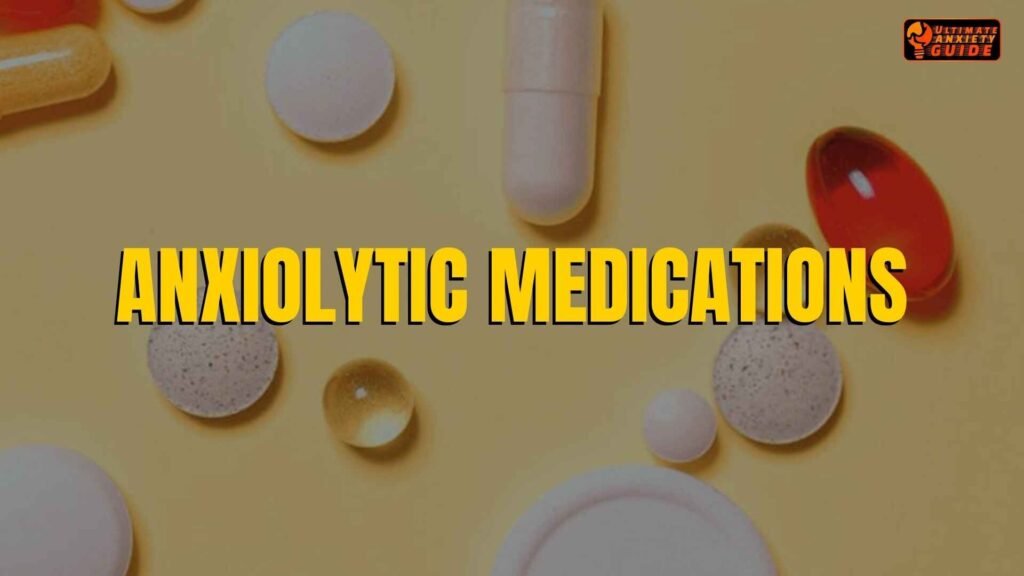
Popular Anxiolytic Medications
1. Benzodiazepines
These are often prescribed for their quick and effective relief from anxiety. They work by boosting the calming effects of a neurotransmitter called GABA.
- Xanax (Alprazolam): Ideal for short-term relief, especially during panic attacks. Just remember, it can be habit-forming and might make you feel drowsy.
- Ativan (Lorazepam): Great for acute anxiety episodes and provides significant relief. However, it’s important to be mindful of potential dependency and sedation.
2. Non-Benzodiazepine Options
These alternatives are effective for managing anxiety without some of the risks associated with benzodiazepines.
- Buspirone: A non-benzodiazepine anxiolytic, Buspirone helps to manage long-term anxiety. It’s generally well-tolerated, though it might take a few weeks to feel its full benefits.
3. Other Common Anxiolytic Medications
While not always classified strictly as anxiolytics, these medications are commonly used to manage anxiety.
- Duloxetine (Cymbalta): An SNRI that works well for both anxiety and depression. It can help to improve your mood, though some people experience nausea or dizziness.
- Bupropion (Wellbutrin): Mostly used for depression and quitting smoking, it’s less effective for anxiety and may even increase discomfort in some.
- Hydroxyzine Pamoate: An antihistamine that provides quick, short-term anxiety relief. It’s non-habit forming but can make you feel drowsy.
- Escitalopram (Lexapro): An SSRI that’s effective for generalized anxiety disorder (GAD) and depression. It’s usually well-tolerated but can cause nausea and sexual side effects.
- Sertraline (Zoloft): Another SSRI that helps with various anxiety disorders and depression. It’s effective but may lead to gastrointestinal issues or trouble sleeping.
- Desvenlafaxine (Pristiq): An SNRI useful for both depression and anxiety. It can be effective but might cause nausea and an increase in blood pressure.
- Quetiapine (Seroquel): An atypical antipsychotic used off-label for severe anxiety. It can be helpful in tough cases but may cause drowsiness and weight gain.
- Trazodone: A SARI is used mainly for depression, but it can also help with anxiety and insomnia. It improves sleep and reduces anxiety, though it might make you feel drowsy and cause a dry mouth.
10 Amazing Benefits of Anxiolytic Medications

1. Immediate Relief from Anxiety
Anxiolytic medications can offer immediate relief from anxiety, especially when it’s intense and overwhelming. Many people find that certain anxiolytics, particularly benzodiazepines, start working within 30 minutes, providing a calming effect that helps you regain your equilibrium and feel more centered. This quick action can be incredibly comforting when you’re facing acute anxiety, allowing you to handle stressful situations with more ease and clarity.
If you’re struggling with severe anxiety and need fast relief, anxiolytic medication might be just what you need. By rapidly addressing those intense feelings, these medications can make a significant difference in your ability to manage day-to-day challenges. It’s like having a tool that helps you stay in control and calm when anxiety hits hard.
2. Improved Sleep Quality
Do you find that anxiety keeps you tossing and turning at night? Anxiolytic medications can help improve sleep quality by calming your mind and reducing the anxious thoughts that often lead to insomnia. When anxiety is under control, you may find it easier to fall asleep and stay asleep throughout the night, leading to more restful and refreshing sleep.
Improving your sleep quality can have a ripple effect on your overall well-being. Better sleep means you wake up feeling refreshed and ready to face the day, which can enhance your mood and productivity. If anxiety-related insomnia is affecting your life, an anxiolytic medication might be a key part of getting those much-needed hours of rest.
3. Enhanced Daily Functioning
When anxiety is under control, you’ll likely notice an improvement in your daily functioning. Anxiolytic medications help to manage anxiety symptoms, making it easier to focus on tasks, whether at work, school or in other areas of life. With reduced anxiety, you can engage more fully in activities and responsibilities, leading to a more balanced and productive life.
Imagine being able to concentrate better and tackle your daily tasks without the constant weight of anxiety. Anxiolytic medications can play a crucial role in helping you achieve this, making your day-to-day experiences more manageable and enjoyable.
4. Reduced Physical Symptoms
Anxiety often appears physically, with symptoms like a racing heart, trembling, and sweating. Anxiolytic medications help to reduce these distressing physical symptoms, making it easier to go about your day without the constant burden of physical anxiety. When these symptoms are reduced, you can focus more on living your life and less on the uncomfortable sensations that come with anxiety.
Feeling physically calmer can lead to a better quality of life overall. By addressing these physical symptoms through anxiolytic medication, you can experience a greater sense of stability and comfort, which helps you to enjoy activities and interactions without the interference of anxiety.
5. Support in Social Situations
Social anxiety can make interactions with others feel overwhelming. Anxiolytic medications can provide support in these situations, making social interactions less stressful and more manageable. By reducing your anxiety, these medications can help you feel more comfortable and confident in social environments, helping you engage with others more naturally.
With the support of anxiolytic medication, social situations that once seemed challenging can become more enjoyable. It’s like having a supportive companion that helps you approach social interactions with greater confidence, helping you build and maintain meaningful connections with others.
6. Improved Response to Therapy
Combining anxiolytic medication with therapy can be highly effective in treating anxiety. When anxiety is managed with medication, it often becomes easier to engage in therapeutic techniques and make progress in therapy sessions. This combined approach can lead to better outcomes and a more comprehensive treatment plan.
If therapy has felt challenging due to high anxiety levels, anxiolytic medication might help you get the most out of your sessions. By reducing the intensity of anxiety, you can focus more on the therapeutic work and achieve the relief and growth you’re seeking.
7. Management of Panic Disorders
Panic disorders involve sudden and intense bursts of fear, which can be both frightening and bothersome. Anxiolytic medications can be effective in managing these panic attacks, preventing them from worsening and providing relief from the intense fear associated with them. This can help you feel more in control and less overwhelmed by unexpected panic attacks.
By using anxiolytic medication to manage panic attacks, you can gain better control over your responses to fear and anxiety. This management can lead to a more stable and less bothersome daily life, enabling you to engage in activities and interactions with greater confidence and comfort.
8. Control Over Phobias
Specific phobias, such as fear of flying or public speaking, can severely limit your activities and opportunities. Anxiolytic medications can provide temporary relief from the intense fear associated with these phobias, making it easier to confront and manage them. This support can help you gradually face your fears and reduce their impact on your life.
With the aid of anxiolytic medication, you can take steps toward overcoming specific phobias and participating in activities that you might otherwise avoid. It’s a way to gently push through your fears and open up new possibilities for your personal and professional life.
9. Support in Withdrawal Symptoms
If you’re reducing other medications or substances, anxiety can sometimes increase as part of withdrawal symptoms. Anxiolytic medications can provide support during this period by alleviating the anxiety that may arise and helping you manage the change more smoothly. This can make the process of withdrawal less troubling and more manageable.
Managing withdrawal can be challenging, but with the help of anxiolytic medication, you can find some relief from the anxiety that comes with this process. This support can be an important part of a complete approach to handling withdrawal and moving toward a healthier, more balanced state.
10. Versatility in Treatment
When it comes to managing anxiety, anxiolytic medication can be a real game-changer. There are different types and dosages available, so you can find a treatment that fits your unique needs. Whether you’re looking for short-term relief or a long-term solution, there’s likely an anxiolytic medication that can help.
What’s great about anxiolytic medication is its flexibility. You and your healthcare provider can customize your treatment to match your specific situation and anxiety levels. This means you don’t have to go with a standard option. Instead, you can work together to find what works best for you.
So, if you’re feeling overwhelmed by anxiety, remember that there are options out there designed to meet your needs. By exploring these options, you can develop a treatment plan that’s just right for you and start feeling better.
10 Common Side Effects of Anxiolytic Medication
If you’re taking anxiolytic medication to manage anxiety, knowing about potential side effects can be really useful. Here’s a friendly overview of what you might experience and how to deal with it:
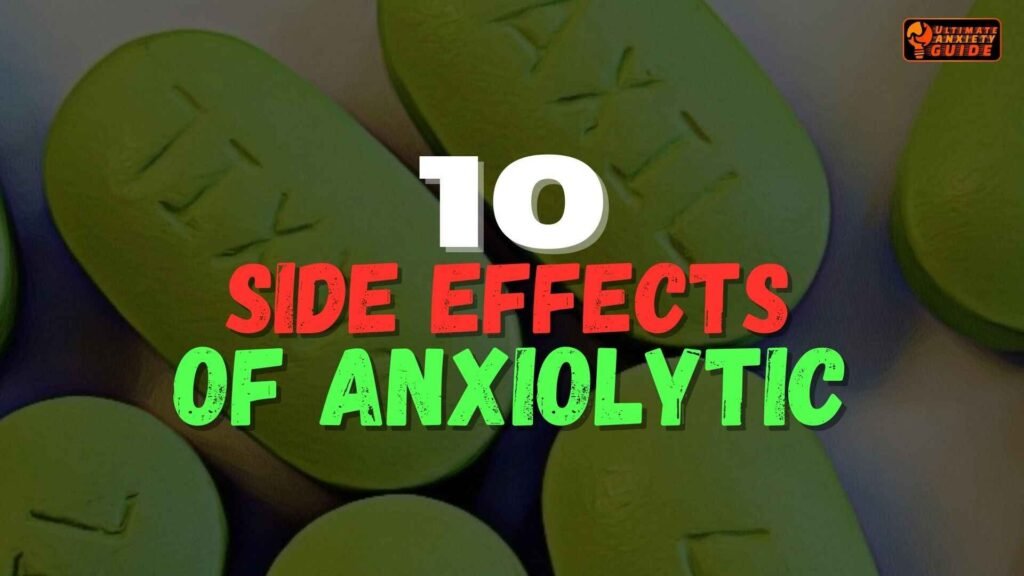
- Drowsiness: One of the most common side effects of anxiolytic medication is drowsiness. If you find yourself feeling sleepy, it’s best to avoid driving or using heavy machinery to stay safe.
- Dizziness: You might experience lightheadedness or dizziness, especially when standing up quickly. If this happens, try standing up slowly and holding onto something steady until you feel balanced.
- Memory Issues: Some anxiolytics, especially benzodiazepines, can impact short-term memory. This might make it harder to recall recent events. If this becomes a concern, be sure to discuss it with your doctor.
- Coordination Difficulties: Anxiolytic medication can sometimes cause problems with coordination, leading to unsteadiness or difficulty with tasks that require careful movements. It’s a good idea to take your time with such activities and be cautious.
- Dependence and Withdrawal: Long-term use of some anxiolytics can lead to physical dependence. If you need to stop the medication, it’s crucial to do so gradually and under your doctor’s supervision to avoid withdrawal symptoms.
- Nausea: Feeling nauseous is another possible side effect. Taking your medication with food might help, and if nausea continues, let your doctor know.
- Fatigue: Feeling unusually tired or lethargic can be a side effect, particularly at higher doses. If this affects your daily life, talk to your healthcare provider about it.
- Mood Changes: While anxiolytics are meant to stabilize mood, some people might experience mood swings or irritability. Keep track of these changes and share them with your doctor if they become bothersome.
- Dry Mouth: A dry or sticky feeling in your mouth can occur with anxiolytic medication. Drinking plenty of water and chewing sugar-free gum can help ease this discomfort.
- Blurred Vision: Temporary vision changes, such as blurriness or double vision, can sometimes happen. If you notice these changes, discuss them with your doctor to ensure everything is okay.
10 Tips to Manage Anxiolytic Side Effects
If you’re taking anxiolytic medication to manage anxiety, it’s important to be aware of potential side effects and how to handle them. Here are ten simple and friendly tips to help you deal with any challenges along the way:
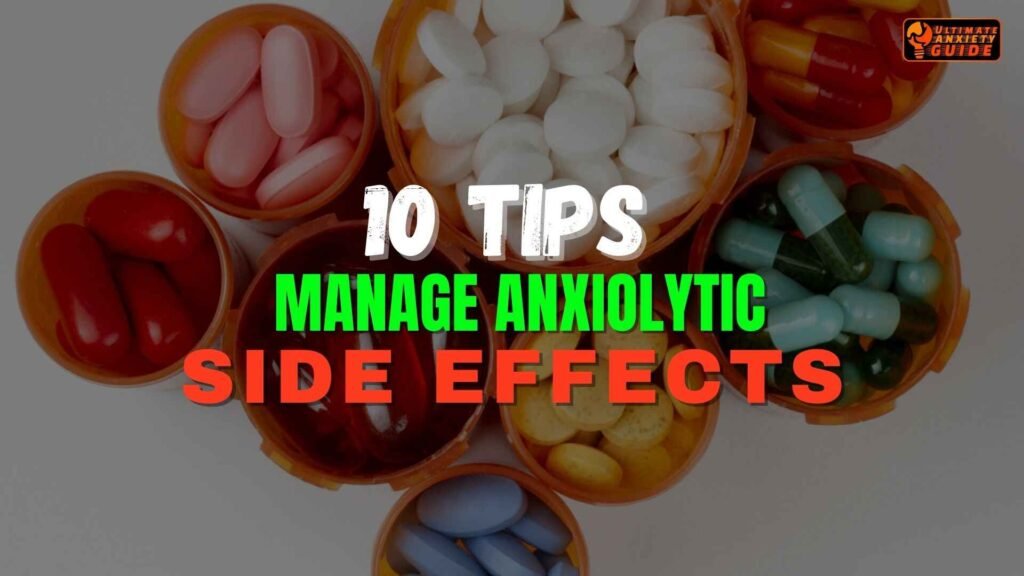
- Start with a Low Dose: Begin with the lowest effective dose of your anxiolytic medication. This helps you understand how your body reacts while minimizing unwanted side effects.
- Take with Food: Taking your medication with a small meal or snack can help reduce any feelings of nausea. It’s a simple trick that can make a big difference!
- Stay Hydrated: Drinking plenty of water can help with common side effects like dry mouth and dizziness. Aim for at least 8 glasses a day to keep yourself feeling good.
- Avoid Alcohol: Alcohol can increase the side effects of anxiolytic medication. It’s best to avoid it to prevent unwanted interactions and maintain your well-being.
- Stick to a Schedule: Try to take your medication at the same time each day. This routine helps keep your medication’s effects steady and can make side effects easier to manage.
- Monitor How You Feel: Pay attention to how you’re feeling and note any side effects you experience. If something seems off or if side effects are severe, let your doctor know.
- Gradual Changes: If you need to stop taking your anxiolytic medication, do so gradually. Never stop suddenly—always follow your doctor’s instructions to avoid withdrawal symptoms.
- Adopt Relaxation Techniques: Enhance the calming effects of your medication by adopting relaxation techniques like deep breathing or meditation. It’s a great way to boost your overall sense of calm.
- Exercise regularly: Regular exercise can help fight off fatigue and boost your mood. Even a daily walk can make a big difference in how you feel while on medication.
- Talk to Your Doctor: Keep open lines of communication with your healthcare provider. If you have concerns or experience side effects, your doctor can help adjust your treatment to better suit your needs.
Taking anxiolytic medication can be a helpful step toward managing anxiety, but it’s important to handle it with care. By following these tips and staying in touch with your healthcare provider, you can address any side effects and make the most of your treatment.
Dosage and Administration
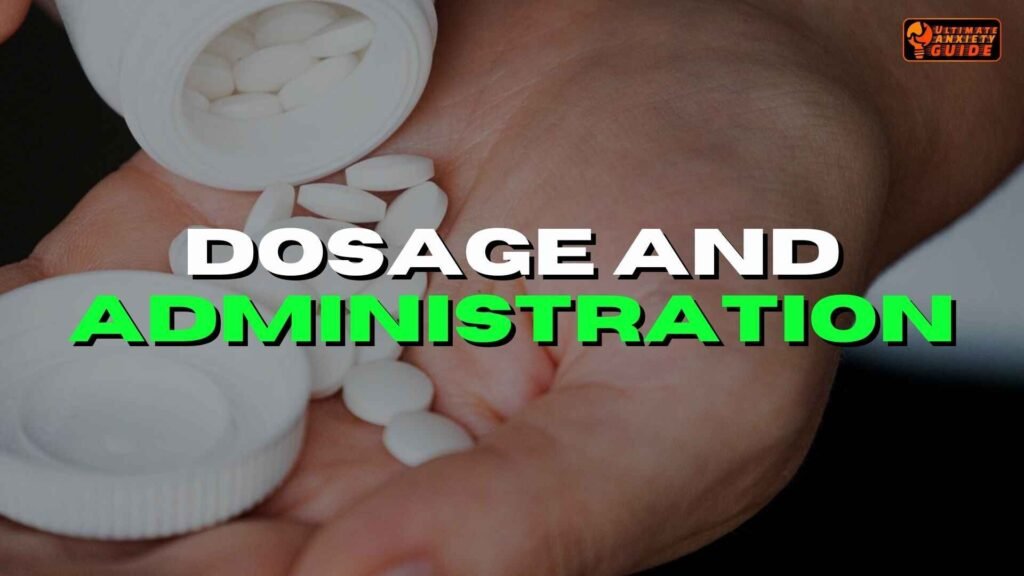
When it comes to anxiolytic medication, getting the dosage right is crucial. Different types of anxiolytics work in various ways, and the right dose for you will depend on several factors, including the exact medication you’re taking, how intense your anxiety is, and your overall health. Benzodiazepines, for example, are often prescribed for short-term relief and might need careful adjustments to find the right balance between effectiveness and side effects.
On the other hand, medications like SSRIs or SNRIs, which are used for long-term anxiety management, usually require a gradual increase in dosage to reach their full benefits. It’s really important to follow your doctor’s instructions exactly and never adjust your dosage on your own. Regular appointments with your doctor can help ensure your treatment is working as intended and make any needed adjustments.
Anxiolytic Alternatives
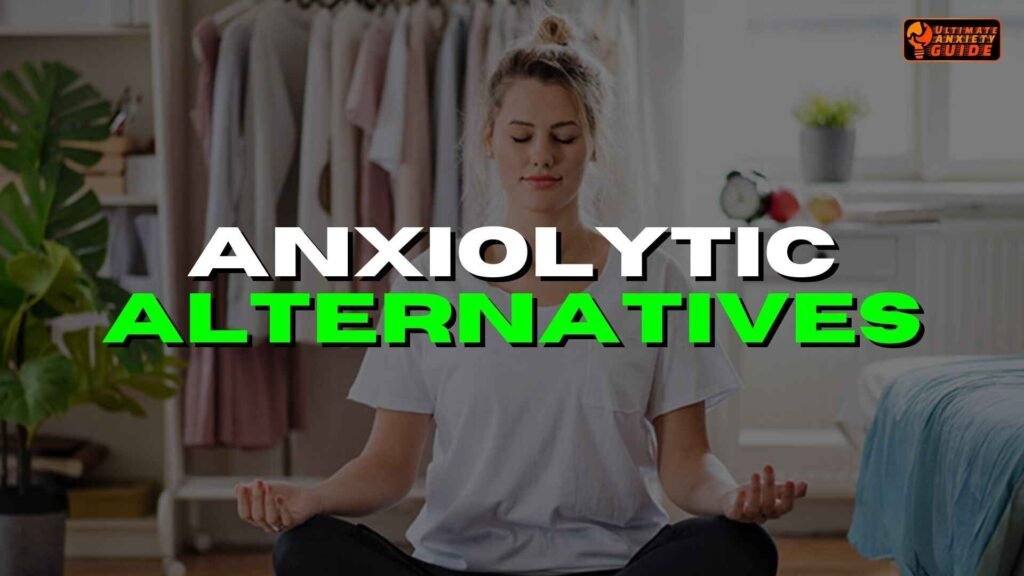
1. Lifestyle Modifications
a. Regular Exercise
Physical activity is a powerful tool for anxiety management. Engaging in exercises such as walking, running, yoga, or strength training can:
- Release Endorphins: Boost your mood and reduce anxiety.
- Improve Sleep: Enhance overall sleep quality.
- Reduce Muscle Tension: Help your body relax.
b. Healthy Diet
What you eat can influence your anxiety levels. Consider adopting::
- Whole Grains, Fruits, and Vegetables: Essential for overall health.
- Lean Proteins: Support balanced energy and mood.
- Omega-3 Fatty Acids: These are found in fish and flaxseeds, and they help to lower anxiety levels.
- Magnesium: Present in leafy greens and nuts, it may reduce anxiety symptoms.
c. Sleep Hygiene
Good sleep is crucial for managing anxiety. To improve your sleep:
- Establish a Regular Routine: Go to bed and wake up at the same time each day.
- Create a Restful Environment: Make your bedroom conducive to sleep.
- Avoid Caffeine and Screens: Reduce intake before bedtime to enhance sleep quality.
d. Stress Management Techniques
Adopt stress management practices such as:
- Deep Breathing: Helps calm the nervous system.
- Progressive Muscle Relaxation: Eases muscle tension.
- Mindfulness: Enhances awareness and reduces stress.
2. Psychological Therapies
a. Cognitive Behavioral Therapy (CBT)
CBT helps you:
- Identify Negative Thought Patterns: Recognize and challenge unhelpful thoughts.
- Develop Practical Strategies: Learn effective coping mechanisms for anxiety.
b. Acceptance and Commitment Therapy (ACT)
ACT focuses on:
- Accepting Anxious Thoughts: Instead of trying to eliminate them.
- Living According to Your Values: Even in the presence of anxiety.
c. Mindfulness-Based Stress Reduction (MBSR)
MBSR combines:
- Mindfulness Meditation: Increases awareness and acceptance of thoughts.
- Yoga: Promotes relaxation and reduces stress.
3. Natural Remedies and Supplements
a. Herbal Supplements
Some herbs may assist in managing anxiety:
- Valerian Root and Passionflower: Known for their calming effects.
- Chamomile: Often used for relaxation.
b. Essential Oils
Aromatherapy with essential oils can help:
- Lavender: Known for its soothing properties.
- Bergamot: May reduce anxiety and improve mood.
c. CBD (Cannabidiol)
CBD, derived from cannabis, might:
- Alleviate Anxiety: Some studies suggest potential benefits.
- Consult a Healthcare Professional: Before starting CBD, ensure it’s suitable for you.
4. Social and Support Networks
a. Support Groups
Joining support groups can:
- Provide Emotional Support: Connect with others who understand your experience.
- Offer Practical Advice: Share coping strategies and support.
b. Social Connections
Maintaining strong relationships with:
- Friends and Family: Help reduce feelings of isolation and provide emotional support.
5. Complementary Therapies
a. Acupuncture
Acupuncture may help by:
- Balancing Energy Flow: Inserting thin needles into specific points on the body.
b. Massage Therapy
Massage therapy can:
- Reduce Muscle Tension: Promote relaxation and alleviate anxiety symptoms.
c. Biofeedback
Biofeedback involves:
- Controlling Physiological Processes: Learn to manage heart rate and muscle tension through real-time feedback.
6. Educational and Self-Help Resources
a. Books and Online Courses
Explore resources that offer:
- Practical Strategies: Self-help books and online courses provide valuable techniques for managing anxiety.
b. Apps
Utilize apps for:
- Guided Meditation: Practice relaxation and mindfulness on the go.
- Anxiety Management Tools: Access tools and exercises to manage anxiety effectively.
Anxiolytic Medication Interactions
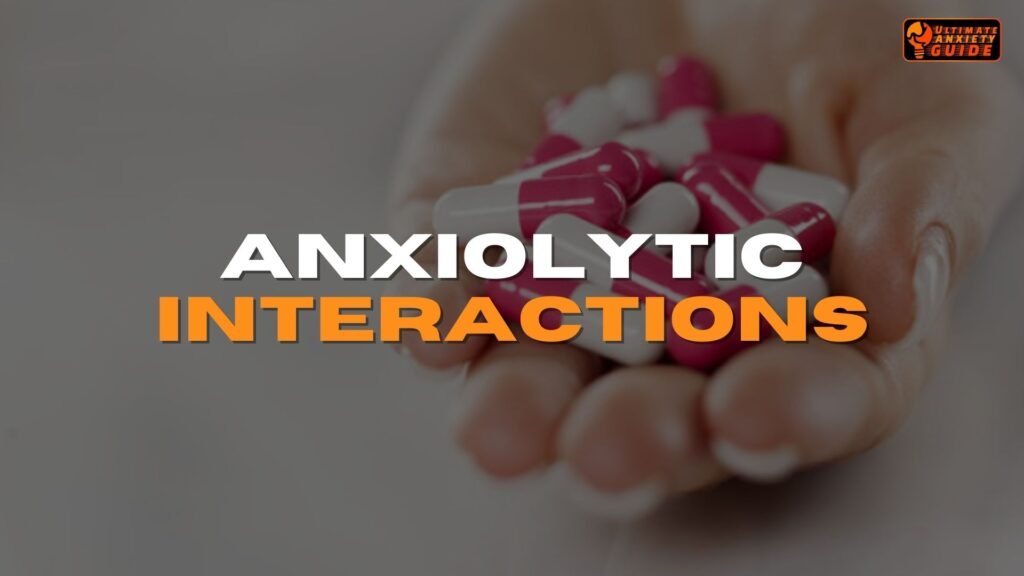
When you’re taking anxiolytic medication, it’s important to be aware of how it can interact with other substances. One major interaction to watch out for is with alcohol. Combining alcohol with anxiolytic medication can increase their sedative effects, which might make you feel overly drowsy or unsteady.
This combination can be risky, as it can also affect your coordination and increase the chances of accidents. To stay safe, it’s best to avoid drinking alcohol while you’re on anxiolytic medication and discuss any concerns with your healthcare provider.
Another aspect to consider is how anxiolytic medication interacts with other drugs and even certain foods. For instance, combining these medications with opioids or other sedatives can increase the risk of severe drowsiness and breathing problems. Even some common foods, like grapefruit juice, can affect how your body processes anxiolytics, potentially leading to unexpected side effects.
To keep everything in check, make sure to tell your doctor about all the medications and supplements you’re taking, as well as your dietary habits. This way, you can avoid any harmful interactions and ensure your treatment works as intended.
When and How to Use Anxiolytic Medication
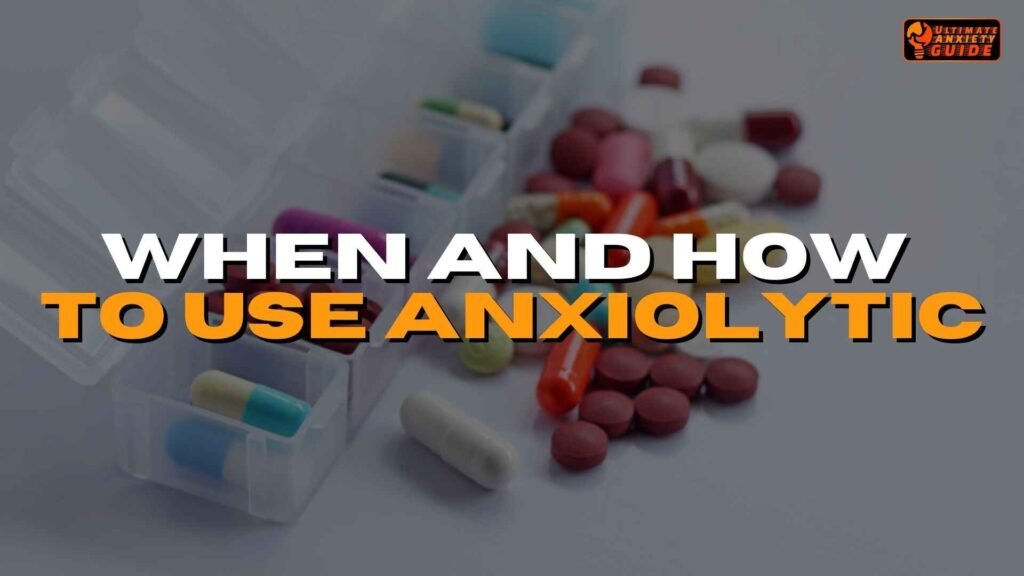
Anxiolytic medication can be a great tool for managing anxiety, especially when you’re dealing with intense, short-term anxiety that affects your daily life. These medications provide quick relief from severe anxiety symptoms, which can be incredibly helpful during stressful times or panic attacks.
However, because they can be habit-forming, they’re generally recommended for short-term use rather than as a long-term solution. Always follow your doctor’s instructions on how to use these medications and never take more than prescribed.
If you’re dealing with chronic anxiety, a broader approach is usually needed. This often includes a combination of medication, therapy, and lifestyle changes. For example, therapy techniques like cognitive-behavioral therapy (CBT) can help you develop coping strategies and address the root causes of your anxiety.
Additionally, making healthy lifestyle choices, such as exercising regularly and managing stress, can be very beneficial. While anxiolytic medication might be part of your treatment plan, it’s often combined with other strategies to provide more lasting relief from anxiety.
Important Considerations
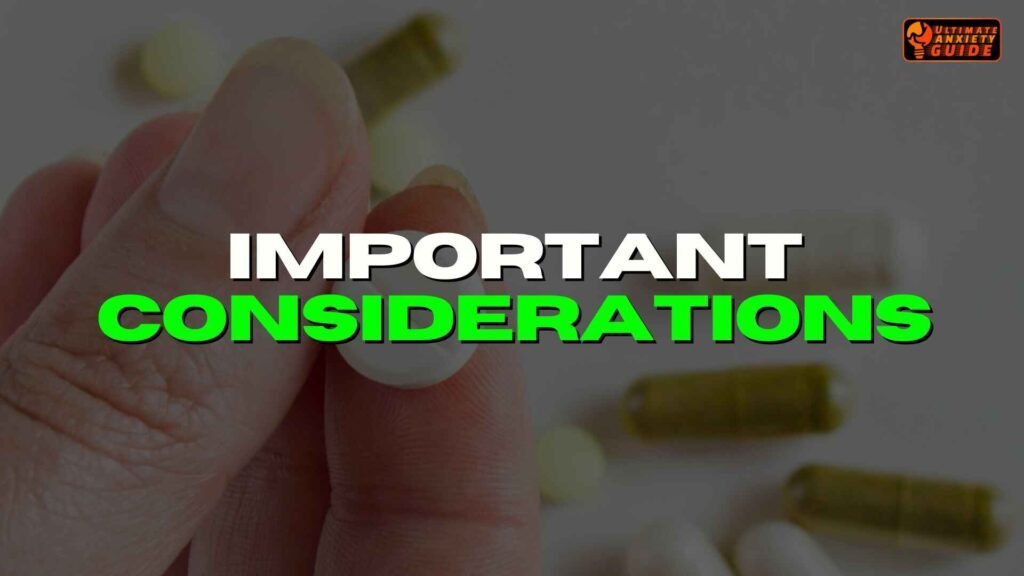
Before starting anxiolytic medication, it’s crucial to consider the potential for dependence, especially with medications like benzodiazepines. If you have a history of substance abuse, make sure to discuss this with your doctor, as it can affect the choice of medication and treatment plan. Your doctor can help you find the safest and most effective approach to managing your anxiety.
It’s also important to think about your long-term plan for dealing with anxiety. Anxiolytic medication is typically used for short-term relief and might not address the root causes of chronic anxiety. A balanced approach, which includes therapy and lifestyle changes, can often provide more sustainable results. Regular check-ins with your healthcare provider are essential to track your progress, adjust your treatment as needed, and make sure you’re on the right path to managing your anxiety effectively.
Conclusion
Anxiolytic medications can truly make a difference when it comes to managing anxiety, offering quick relief, and helping you improve your overall quality of life. If you’re struggling with anxiety, these medications might be a helpful part of your journey towards feeling better. They can act fast and help you regain control, allowing you to engage more fully in your daily activities.
But, it’s important to use anxiolytic medication carefully. They come with their own set of potential side effects and risks, like dependence, which is why they are typically recommended for short-term use. Think of anxiolytic medication as just one piece of a larger puzzle. To effectively manage anxiety, consider combining them with other strategies such as therapy, lifestyle changes, and alternative treatments.
Final Thoughts
While anxiolytic medications can be incredibly effective, they aren’t a universal fix for everyone. Finding what works best for you often involves working closely with your healthcare provider. They can help you explore your options and create a treatment plan that fits your individual needs. This customized approach ensures you to get the right combination of treatments that address your anxiety in the most effective way. By understanding both the benefits and potential side effects of anxiolytic medication, you can make thoughtful decisions about your treatment. Remember, the goal is to find a solution that helps you feel your best and supports your overall mental well-being.
Engage with Us
Alright, dear visitors,
That’s all from my end. As of now, I’d love to hear from you—share your thoughts and experiences in the comments below. For more mental health-related content and updates, stay in touch with Ultimate Anxiety Guide and keep connected. If you want to connect personally, feel free to email us at ultimateanxietyguide@gmail.com.
Thanks a trillion for your time and effort.
Happy Browsing!
FAQs
